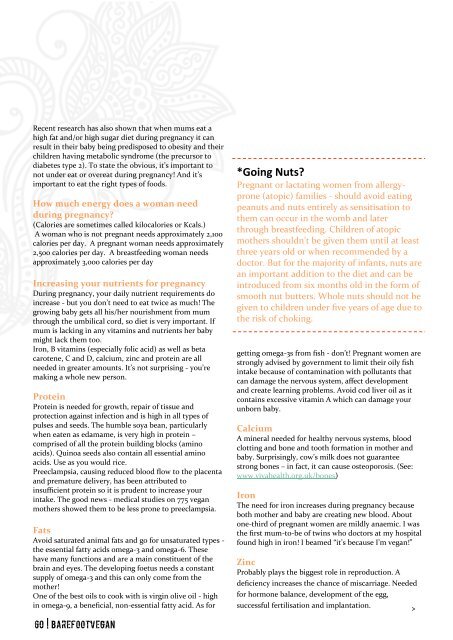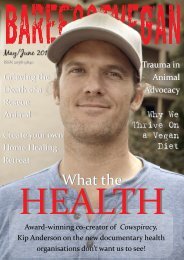barefoot vegan sept_oct issue.pdf
- No tags were found...
Create successful ePaper yourself
Turn your PDF publications into a flip-book with our unique Google optimized e-Paper software.
Recent research has also shown that when mums eat a<br />
high fat and/or high sugar diet during pregnancy it can<br />
result in their baby being predisposed to obesity and their<br />
children having metabolic syndrome (the precursor to<br />
diabetes type 2). To state the obvious, it’s important to<br />
not under eat or overeat during pregnancy! And it’s<br />
important to eat the right types of foods.<br />
How much energy does a woman need<br />
during pregnancy?<br />
(Calories are sometimes called kilocalories or Kcals.)<br />
A woman who is not pregnant needs approximately 2,100<br />
calories per day. A pregnant woman needs approximately<br />
2,500 calories per day. A breastfeeding woman needs<br />
approximately 3,000 calories per day<br />
Increasing your nutrients for pregnancy<br />
During pregnancy, your daily nutrient requirements do<br />
increase - but you don’t need to eat twice as much! The<br />
growing baby gets all his/her nourishment from mum<br />
through the umbilical cord, so diet is very important. If<br />
mum is lacking in any vitamins and nutrients her baby<br />
might lack them too.<br />
Iron, B vitamins (especially folic acid) as well as beta<br />
carotene, C and D, calcium, zinc and protein are all<br />
needed in greater amounts. It’s not surprising - you’re<br />
making a whole new person.<br />
Protein<br />
Protein is needed for growth, repair of t<strong>issue</strong> and<br />
protection against infection and is high in all types of<br />
pulses and seeds. The humble soya bean, particularly<br />
when eaten as edamame, is very high in protein –<br />
comprised of all the protein building blocks (amino<br />
acids). Quinoa seeds also contain all essential amino<br />
acids. Use as you would rice.<br />
Preeclampsia, causing reduced blood flow to the placenta<br />
and premature delivery, has been attributed to<br />
insufficient protein so it is prudent to increase your<br />
intake. The good news - medical studies on 775 <strong>vegan</strong><br />
mothers showed them to be less prone to preeclampsia.<br />
Fats<br />
Avoid saturated animal fats and go for unsaturated types -<br />
the essential fatty acids omega-3 and omega-6. These<br />
have many functions and are a main constituent of the<br />
brain and eyes. The developing foetus needs a constant<br />
supply of omega-3 and this can only come from the<br />
mother!<br />
One of the best oils to cook with is virgin olive oil - high<br />
in omega-9, a beneficial, non-essential fatty acid. As for<br />
*Going Nuts?<br />
Pregnant or lactating women from allergyprone<br />
(atopic) families - should avoid eating<br />
peanuts and nuts entirely as sensitisation to<br />
them can occur in the womb and later<br />
through breastfeeding. Children of atopic<br />
mothers shouldn’t be given them until at least<br />
three years old or when recommended by a<br />
d<strong>oct</strong>or. But for the majority of infants, nuts are<br />
an important addition to the diet and can be<br />
introduced from six months old in the form of<br />
smooth nut butters. Whole nuts should not be<br />
given to children under five years of age due to<br />
the risk of choking.<br />
getting omega-3s from fish - don’t! Pregnant women are<br />
strongly advised by government to limit their oily fish<br />
intake because of contamination with pollutants that<br />
can damage the nervous system, affect development<br />
and create learning problems. Avoid cod liver oil as it<br />
contains excessive vitamin A which can damage your<br />
unborn baby.<br />
Calcium<br />
A mineral needed for healthy nervous systems, blood<br />
clotting and bone and tooth formation in mother and<br />
baby. Surprisingly, cow’s milk does not guarantee<br />
strong bones – in fact, it can cause osteoporosis. (See:<br />
www.vivahealth.org.uk/bones)<br />
Iron<br />
The need for iron increases during pregnancy because<br />
both mother and baby are creating new blood. About<br />
one-third of pregnant women are mildly anaemic. I was<br />
the first mum-to-be of twins who d<strong>oct</strong>ors at my hospital<br />
found high in iron! I beamed “it’s because I’m <strong>vegan</strong>!”<br />
Zinc<br />
Probably plays the biggest role in reproduction. A<br />
deficiency increases the chance of miscarriage. Needed<br />
for hormone balance, development of the egg,<br />
successful fertilisation and implantation.<br />
><br />
60 | BarefootVegan





